- Home
- Alex Archer
Clockwork Doomsday
Clockwork Doomsday Read online
A key. An ancient automaton. A race against the devil to the deep blue sea…
It started in 48 B.C. when a centurion on a rescue mission for Julius Caesar went down with the ship in a storm. With his last breath, he saw the object of Caesar’s seafaring excursion—an accursed, mechanical minotaur—hit bottom…and start to walk away.
While taping an episode of Chasing History’s Monsters, TV host and archaeologist Annja Creed learns that her sometime friend and protector Garin has acquired an ancient butterfly key artifact, the kind once used to wind automatons, clockwork-style devices. Except, this key comes with a rumor attached, a story that it once worked a god-touched device both rare and unbelievably powerful.
No sooner does Garin hold the key than it’s snatched from his hands by a freewheeling historian who plays by her own rules. And she wants ultimate power, which could happily include the sword of Joan of Arc. The quest for the key and the mythological automaton reunites Annja, Garin and his old mentor Roux in Genoa, and pits them in a race across Europe to beat a foe as resourceful and skilled as Annja herself.
She had the Russians’ attention now...
The gunman wasn’t going to hold back forever. Knowing her chances of escape were diminishing by the second, Annja looked around until she found a baseball-size chunk of tombstone on the ground. She shifted her sword to her left hand and threw the stone in an underhanded pitch.
The rock streaked across the twenty feet separating her from the Russian as he tried to bring his assault rifle around. Too late. Annja had already sprinted across the distance. Whipping her sword in front of her in a fluid motion, she spun and slammed the hilt into the back of the man’s head.
His eyes fluttered, rolled upward, and he dropped.
Annja turned toward the gates, but before she could take a step, she heard the helicopter rotors overhead. In the next instant, a spotlight picked her out of the darkness.
“Cape Cod Coast Guard! Stop right there!”
Frustrated, Annja did as she was told. Besides, she didn’t have to run from law enforcement.
My producer is really going to hear about this.
Annja held her arms out and let the sword drop.
Titles in this series:
Tear of the Gods
The Oracle’s Message
Cradle of Solitude
Labyrinth
Fury’s Goddess
Magic Lantern
Library of Gold
The Matador’s Crown
City of Swords
The Third Caliph
Staff of Judea
The Vanishing Tribe
Clockwork Doomsday
Destiny
Solomon’s Jar
The Spider Stone
The Chosen
Forbidden City
The Lost Scrolls
God of Thunder
Secret of the Slaves
Warrior Spirit
Serpent’s Kiss
Provenance
The Soul Stealer
Gabriel’s Horn
The Golden Elephant
Swordsman’s Legacy
Polar Quest
Eternal Journey
Sacrifice
Seeker’s Curse
Footprints
Paradox
The Spirit Banner
Sacred Ground
The Bone Conjurer
Tribal Ways
The Dragon’s Mark
Phantom Prospect
Restless Soul
False Horizon
The Other Crowd
CLOCKWORK DOOMSDAY
The Legend
...The English commander took Joan’s Sword and raised it high.
The broadsword, plain and unadorned, gleamed in the firelight. He put the tip against the ground and his foot at the center of the blade. The broadsword shattered, fragments falling into the mud. The crowd surged forward, peasant and soldier, and snatched the shards from the tramplued mud. The commander tossed the hilt deep into the crowd.
Smoke almost obscured Joan, but she continued praying till the end, until finally the flames climbed her body and she sagged against the restraints.
Joan of Arc died that fateful day in France, but her legend and sword are reborn...
Contents
Prologue
Chapter 1
Chapter 2
Chapter 3
Chapter 4
Chapter 5
Chapter 6
Chapter 7
Chapter 8
Chapter 9
Chapter 10
Chapter 11
Chapter 12
Chapter 13
Chapter 14
Chapter 15
Chapter 16
Chapter 17
Chapter 18
Chapter 19
Chapter 20
Chapter 21
Chapter 22
Chapter 23
Chapter 24
Chapter 25
Chapter 26
Chapter 27
Chapter 28
Chapter 29
Chapter 30
Chapter 31
Chapter 32
Chapter 33
Chapter 34
Chapter 35
Chapter 36
Epilogue
Prologue
Aegean Sea
48 BCE
“How far away is land?” Ceionius Gabinius held on to the ship’s railing and silently prayed to Neptune to spare him and his men from the storm-tossed sea crashing around Neptune’s Concordia. His stomach convulsed, but he had been sick for hours and there was nothing left for him to give up. He tilted back his head and gazed at the whirling dark gray clouds scudding across the sky.
Philemon, the ship’s elderly captain, clapped Ceionius on the shoulder and smiled, revealing many missing teeth. “Are you nervous, then, Centurion?”
Ceionius shrugged off the man’s hand and thought seriously of killing the captain where he stood. No one questioned Caesar’s chosen army without paying a price. In his late thirties, a soldier in the military since he was a boy, Ceionius was thickset with muscle, a compact man capable of straightening horseshoes with his bare hands. His hair and beard were black as a raven’s wing. The breastplate of his armor shone from hours of work on it. Rain trickled down from his helmet and the tall red plume that marked him as a commander. He carried his shield and spears over one shoulder, always ready to do battle.
“Give me a gladius, Captain Philemon, and a square yard of land, and I’ll fight any man or beast.” Ceionius waved toward the pounding waves. “But I cannot fight the sea.”
“Then you are in luck, Centurion, for I have been fighting the sea all my life, with Neptune’s good graces.” Philemon gazed out at the storm clouds. “And I have won every battle I have fought. As to where land is, it lies that way.” He indicated a few points to starboard off the bow. “We are now only a mile or so from the coastline. We should sail into port in short order.”
Rain dripped from the brow piece of Ceionius’s helmet. On other campaigns, that same helmet had dripped blood. In fact, the campaign he currently served, though in supposed secret, had earlier turned bloody. He had lost twenty-eight men and another nine were wounded, and his unit had never reached the full one hundred to begin with. Caesar was doing that to many of his units these days, shorting them to sixty. His surviving twenty-three were—as was Ceionius
himself—bone tired and ready to return home to their families. Once they were in port, they would have a long journey ahead of them overland in the summer heat.
But at least Ceionius would once more have firm ground under his feet.
Philemon pulled at his beard and stared into the steadily darkening sky as if to read the portents there. “You have never said what took you to those islands, my friend.”
Ceionius rankled at the casual use of the term friend. He did not take those assignations lightly. His friends were the men he served with, men who had trusted him and who had shed blood with him.
“No, I have not. Nor will I.” Ceionius gave the captain a cold stare. The question brought up horrible memories of the caves and all of those traps that had claimed so many lives. Some of them had been left behind, but none of those could have survived the madness in those undersea chambers.
Gods, but he had thought they would go deeply enough to meet Pluto himself in the Underworld.
A cry came from the lookout astern. “Waterspout! Waterspout!”
Turning, Ceionius put his hand on the hilt of his gladius, as if that might somehow save him. He stared in horror at the funnel of wind and water that sped across the sea in their wake. It stood at least two hundred feet tall and contained several large fish in its embrace. A chill lanced through Ceionius as he realized the waterspout pursued them.
Neptune will not allow you to take this sacred beast from its home, Roman. The old man’s dying words had haunted Ceionius’s dreams since they had quit the island.
Ceionius didn’t even know what the beast meant to Caesar. His orders had been only to retrieve it and bring it to Rome and to the general. The first sight of it had disturbed the centurion like nothing ever had before, and he had seen a great many things during his years campaigning.
Philemon slapped Ceionius on the arm. “Release your sword. Hold tight to the railing and the rigging if you would live.” Then the old man raised his voice against the howling winds that were overtaking them. “Drop the sail! Hold the starboard oars! Pull the port oars! Double-time!”
At the hold, an officer relayed the orders to the drummer below. The tempo changed, and the slaves dipped their port oars into the water faster. The great ship angled in an effort to avoid the approaching waterspout.
Gripping the railing, Ceionius blinked against the saltwater spray that stung his eyes. Despite the crew’s best efforts, the waterspout caught up with them and shattered the mast, tangling the rigging in broken yard arms as it came billowing down.
Hunkering down to avoid the maelstrom passing above them, Ceionius felt his stomach at the back of his throat as the ship twisted and turned. A great wall of water rose up from the sea and splashed down over them. Pushed by the towering wave, Neptune’s Concordia almost laid over on its side. Screaming sailors shot across the deck as Ceionius clung to the railing.
Caught off guard, Philemon was one of the luckless men that got tossed overboard. Clawing for purchase, he fell into the white-capped waters.
Then, as quickly as it came, the waterspout was gone. The damage had been done, though. As the ship righted itself, even Ceionius knew something was wrong. The vessel felt sluggish now, though it still rocked precariously as it rode out the waves. It also no longer charted a course, flopping like a wounded animal seeking shelter.
A sailor climbed up from the hold and ran over to Ceionius. He was young and frightened, his face pale. “Where’s the captain?”
“Overboard.”
The sailor looked at the dark water and appeared on the verge of tears. “We are lost. The gods have forsaken us.”
“What are you talking about?”
The sailor pointed to the rear of the ship. “We’ve lost the tiller, and the hold below has broken. We’re taking on water. We’re going to lose the ship.”
Steeling himself, Ceionius looked for what was left of his men. Five remained on deck.
He called to them and pointed to one of the small boats lashed to the side. “Guard that boat with your lives, because they surely depend on it.”
They nodded and made their way across the heaving boards, grabbing hold of the longboat and drawing their swords.
Although he feared what he was about to call on himself to do, Ceionius released the railing and ran to the hold. He clambered down the steps and arrived in the ship’s waist where the slaves were chained to the oars. They called out as they pulled to the beat of the drum.
“You have to let us go!”
“You can’t let us drown like rats!”
Overseers cursed the oarsmen and whipped them onward. Water sluiced across the floor, and more came crashing in as another wave smashed against the ship and flooded in through the oarlocks.
“If you’re to have any chance at all, you have to pull!”
Ignoring them, Ceionius ran to the next hold that led even farther down to the cargo area. The rest of his men were there, the wounded as well as those guarding the thing they had brought back from the accursed island. He clambered down, boots slipping in the water.
The cargo hold was spacious, lit by lanterns whose flames fluttered like winged insects inside the glass. Amid the stores and provisions for the journey, and among the trade goods the captain had expected to profit from, the thing from the island sat wrapped in canvas sailcloth, ringed by the Roman soldiers.
Ceionius realized he was standing in water that reached his midcalf. Water in the hold wasn’t unusual, but it usually wasn’t any higher than the rocks carried as ballast to help keep the ship stable.
Ceionius clamped down on his fear and walked toward his men, holding one of the lanterns to illuminate his face so the soldiers would recognize him.
“Centurion.” Fabius, Ceionius’s second, stood ready as always.
“We’ve got to get the thing onto a boat.” Under the canvas, it was ten feet long and six feet tall, twice as broad as a man’s shoulders. Moving it was going to be difficult. His words barely carried above the rough pounding of the sea. Rolling thunder filled the cargo hold. “We’re only a mile out from the shore. We can do this. Caesar needs us. We will not fail him. We will not fail Rome.”
Ceionius didn’t like standing next to it. None of them did. They didn’t understand it, but it radiated power.
And it clicked.
Ceionius had thought that sometime during the ocean journey at least that hateful noise would stop. It hadn’t. He heard the clicking, steady and measured. Grimly, he took up one of the lines that secured the canvas over it.
Before he could make another move, the ship lifted and tilted, and then the middle of the vessel ripped asunder. The cold sea poured in, rapidly filling the hold.
Ceionius fought to ascend, but the rushing water overtook him, lifted him from his feet and smashed him into the bulkhead. He flailed, trying to swim and divest himself of the armor that dragged him down at the same time.
Neptune’s Concordia, split open like a gutted fish, sank like a rock.
Holding his breath, twisting this way and that with the current, Ceionius watched as the sea claimed the object they had given so much to recover. Somehow the ropes and canvas came free, and even underwater Ceionius was able to make the thing out.
Fashioned out of some metal, the minotaur’s bull’s head topped a giant’s body. The horns spread wider than the thing’s broad shoulders.
Trapped by his armor, unable to free himself, Ceionius watched as the crates, the ballast and his men sank toward the ocean floor. He could still see clearly enough to watch as the minotaur reached the sea bottom first.
Struggling to hold his breath while his lungs were bursting, Ceionius knew he was about to die.
Still clicking—the sound carrying remarkably well through the water—the minotaur started walking.
Vision dimming, Ceionius thoug
ht he was imagining the creature come to life. Or maybe Neptune had called the minotaur home.
Then, unable to prevent himself, Ceionius breathed in the sea and his senses left him in a crushing rush.
1
Outside Salem, Massachusetts
“You should be here at Halloween.”
Tramping across the marshy ground with her flashlight, searching for a firmer trail in the tall grass, Annja Creed glanced at her two companions. In the darkness of the Evergreen Harbor Cemetery, it was hard to tell them apart.
Twenty-year-old goth Colleen Digby was just shy of five and a half feet and wore all black, a skirt over skinny jeans and a hooded trench coat over that. She rustled every time she took a step, and the muddy ground sucked at her boots. Her cropped black hair had an electric-blue streak through it. Her dark makeup stood out against her pallid face.
In a black steampunk double-breasted jacket cut high in the front with a tail nearly down to his ankles, Victor Lambert’s hair was cut only a little shorter than his girlfriend’s, but he’d left it long in front so it dangled in his eyes. They walked so closely together that they looked, more often than not, Annja thought, like a two-headed creature.
Annja regretted wearing a dark turtleneck and cargo pants, because it smacked too much of the look her two guides favored. She wasn’t even sure which one had spoken to her. Their voices sounded a lot alike. “Why Halloween?”
“The whole town loves Halloween.” Colleen looked at her.
“They go all out.” Victor watched the surrounding woods with his head ducked slightly, as if he thought he was going to be attacked at any moment. “Decorations. Parties. They’ve even talked about hanging a witch, just for old times’ sake.”
“He’s kidding.” Colleen rolled her eyes.
“Maybe I’m kidding. People go missing here, Colleen. For all you know some of the frat houses at the college grab women during Pledge Week and haul them up to Gallows Hill to string them up in the same place they killed all those suspected witches.”
“They don’t do that.”
“How do you know? Remember when that woman went missing last year? The one who ran that herbal shop? I was told that was what happened to her.”

 Rogue Angel: Forbidden City
Rogue Angel: Forbidden City The Spider Stone
The Spider Stone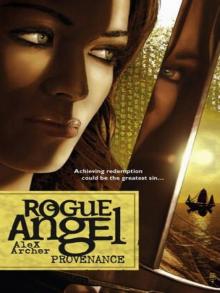 Provenance
Provenance Blood Cursed
Blood Cursed Fury's Goddess
Fury's Goddess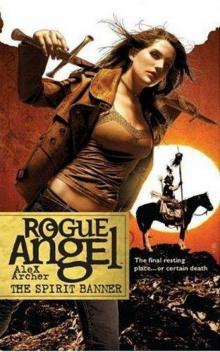 The Spirit Banner
The Spirit Banner Footprints
Footprints The Pretender's Gambit
The Pretender's Gambit Rogue Angel: The Lost Scrolls
Rogue Angel: The Lost Scrolls Staff of Judea
Staff of Judea Rogue Angel 55: Beneath Still Waters
Rogue Angel 55: Beneath Still Waters The Mortality Principle
The Mortality Principle Warrior Spirit
Warrior Spirit Paradox
Paradox Tear of the Gods
Tear of the Gods Forbidden City
Forbidden City River of Nightmares (Rogue Angel)
River of Nightmares (Rogue Angel) Rogue Angel: The Secret of the Slaves
Rogue Angel: The Secret of the Slaves Destiny
Destiny Rogue Angel 51: The Pretender's Gambit
Rogue Angel 51: The Pretender's Gambit Celtic Fire
Celtic Fire Rogue Angel 54: Day of Atonement
Rogue Angel 54: Day of Atonement Day of Atonement
Day of Atonement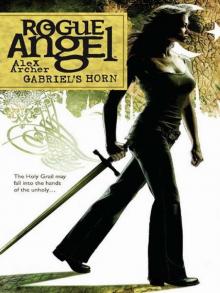 Rogue Angel: Gabriel's Horn
Rogue Angel: Gabriel's Horn Grendel's Curse
Grendel's Curse The Matador's Crown
The Matador's Crown Rogue Angel: The Chosen
Rogue Angel: The Chosen The Other Crowd
The Other Crowd Seeker’s Curse
Seeker’s Curse Rogue Angel 52: Death Mask
Rogue Angel 52: Death Mask The Golden Elephant
The Golden Elephant Blood Cursed (Rogue Angel)
Blood Cursed (Rogue Angel) Celtic Fire (Rogue Angel)
Celtic Fire (Rogue Angel)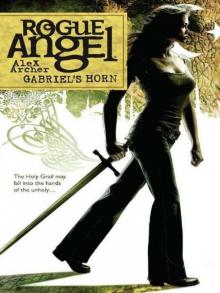 Gabriel's Horn
Gabriel's Horn Magic Lantern (Rogue Angel)
Magic Lantern (Rogue Angel) God of Thunder
God of Thunder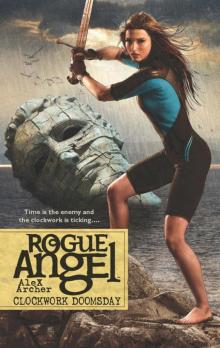 Clockwork Doomsday
Clockwork Doomsday The Bone Conjurer
The Bone Conjurer Treasure of Lima
Treasure of Lima The Soul Stealer
The Soul Stealer The Dragon’s Mark
The Dragon’s Mark Restless Soul
Restless Soul Rogue Angel: God Of Thunder
Rogue Angel: God Of Thunder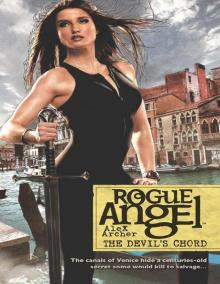 Rogue Angel 49: The Devil's Chord
Rogue Angel 49: The Devil's Chord Death Mask
Death Mask Rogue Angel 46: Treasure of Lima
Rogue Angel 46: Treasure of Lima Swordsman's Legacy
Swordsman's Legacy The Oracle's Message
The Oracle's Message The Third Caliph
The Third Caliph Tribal Ways
Tribal Ways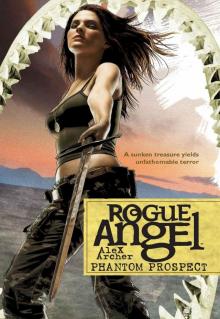 Phantom Prospect
Phantom Prospect Rogue Angel 50: Celtic Fire
Rogue Angel 50: Celtic Fire Library of Gold
Library of Gold Rogue Angel 53: Bathed in Blood
Rogue Angel 53: Bathed in Blood Sacred Ground
Sacred Ground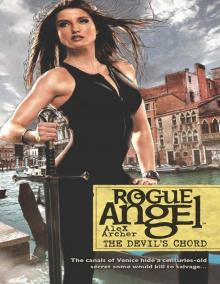 The Devil's Chord
The Devil's Chord Serpent's Kiss
Serpent's Kiss The Vanishing Tribe
The Vanishing Tribe Sunken Pyramid
Sunken Pyramid Sunken Pyramid (Rogue Angel)
Sunken Pyramid (Rogue Angel)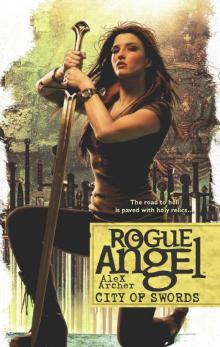 City of Swords
City of Swords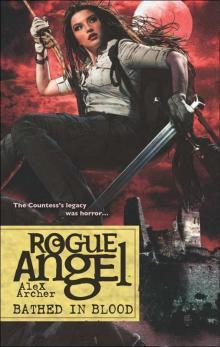 Bathed in Blood
Bathed in Blood The Lost Scrolls
The Lost Scrolls The Babel Codex
The Babel Codex Mystic Warrior
Mystic Warrior Eternal Journey
Eternal Journey Beneath Still Waters
Beneath Still Waters Solomon's Jar
Solomon's Jar Beneath Still Waters (Rogue Angel Book 55)
Beneath Still Waters (Rogue Angel Book 55) Cradle of Solitude
Cradle of Solitude Secret of the Slaves
Secret of the Slaves River of Nightmares
River of Nightmares Polar Quest
Polar Quest False Horizon
False Horizon